Unit 1 Food for thought Using language 语法课件(共26张PPT)-2025-2026学年外研版(2019)必修第二册
文档属性
| 名称 | Unit 1 Food for thought Using language 语法课件(共26张PPT)-2025-2026学年外研版(2019)必修第二册 |  | |
| 格式 | pptx | ||
| 文件大小 | 6.1MB | ||
| 资源类型 | 教案 | ||
| 版本资源 | 外研版(2019) | ||
| 科目 | 英语 | ||
| 更新时间 | 2025-07-20 22:39:11 | ||
图片预览

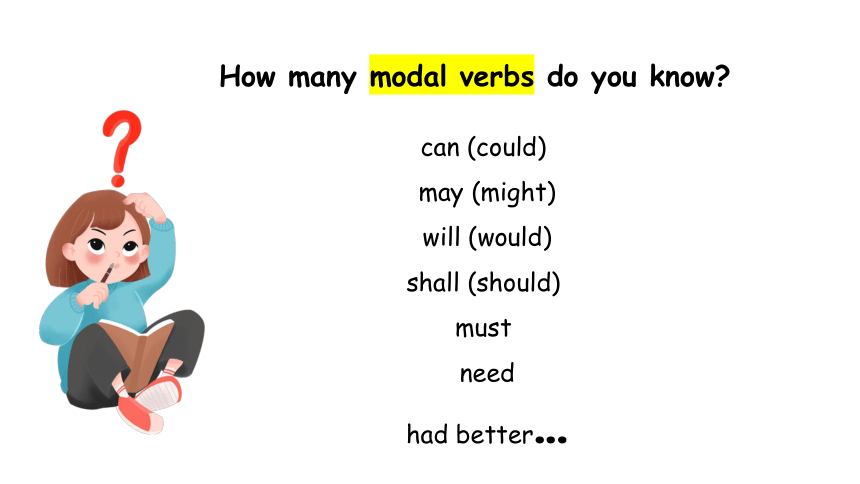
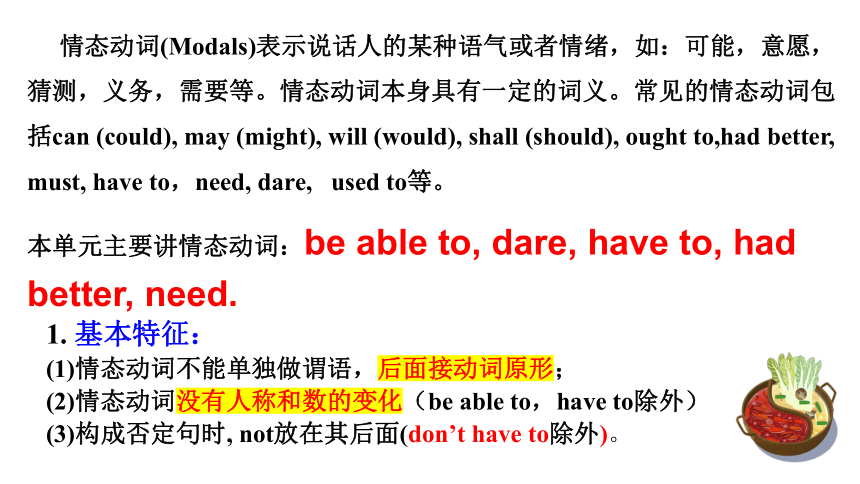
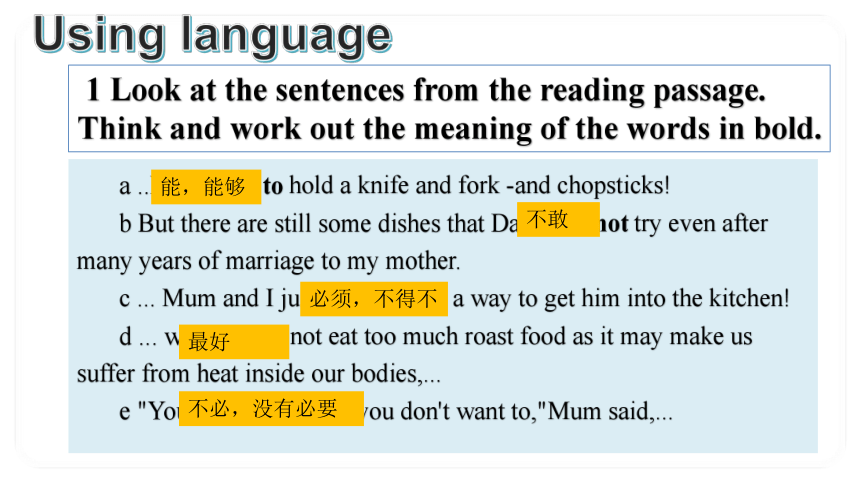
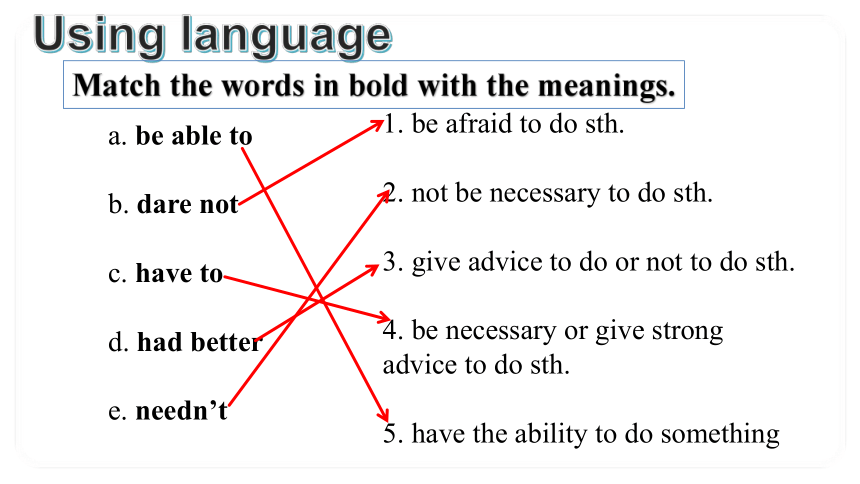
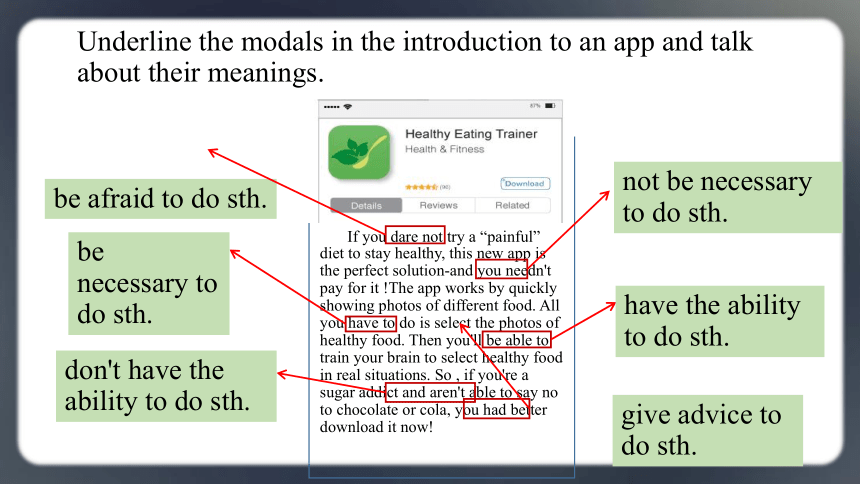
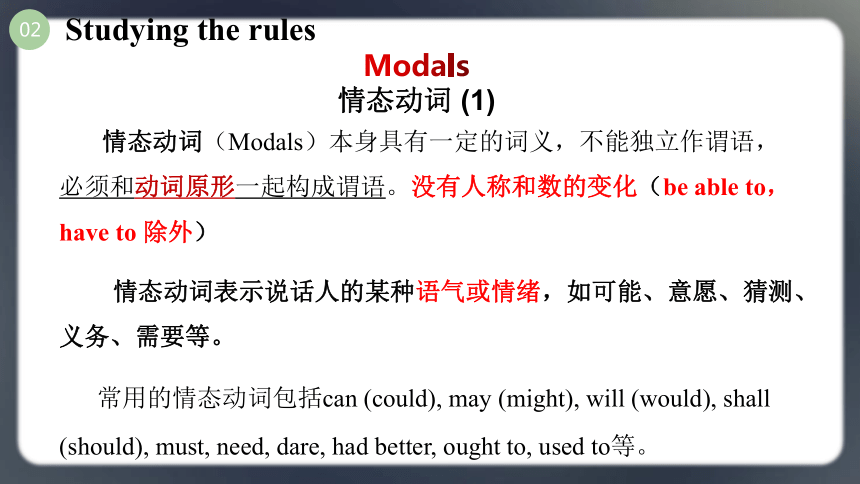
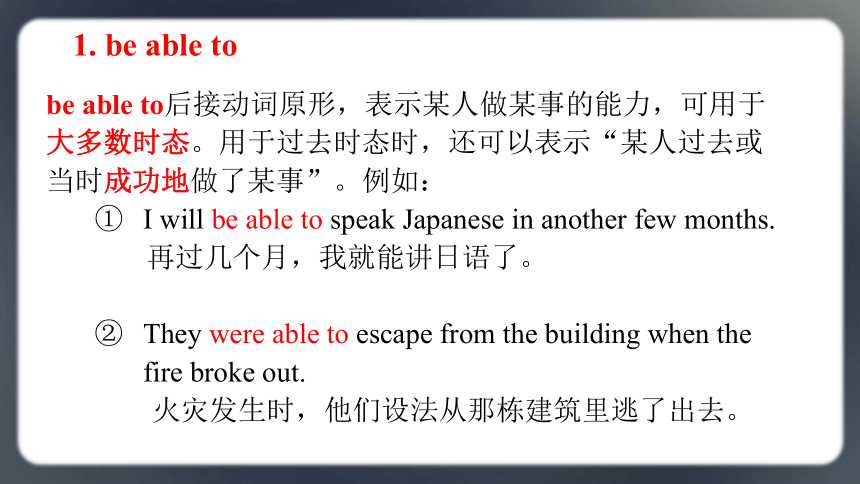
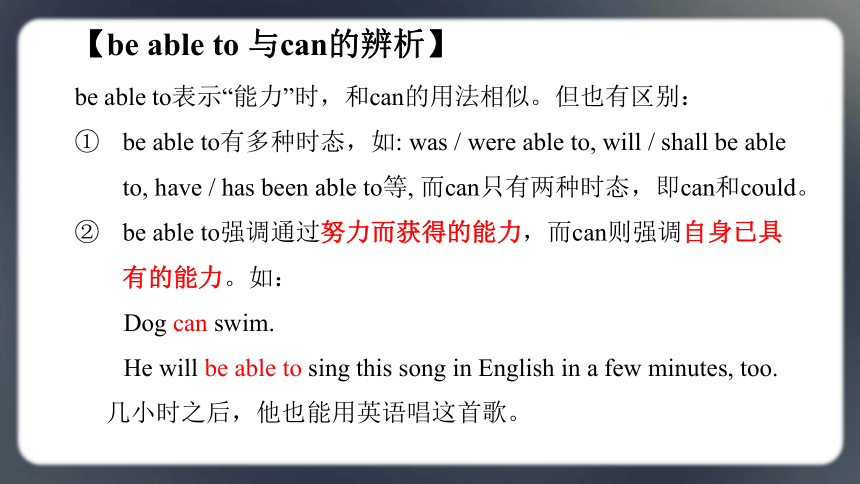
文档简介
(共26张PPT)
Unit 1 Food for thought
Using language Ⅰ P5
How many modal verbs do you know
can (could)
may (might)
will (would)
shall (should)
must
need
had better...
情态动词(Modals)表示说话人的某种语气或者情绪,如:可能,意愿,猜测,义务,需要等。情态动词本身具有一定的词义。常见的情态动词包括can (could), may (might), will (would), shall (should), ought to,had better, must, have to,need, dare, used to等。
本单元主要讲情态动词:be able to, dare, have to, had better, need.
1. 基本特征:
(1)情态动词不能单独做谓语,后面接动词原形;
(2)情态动词没有人称和数的变化(be able to,have to除外)
(3)构成否定句时, not放在其后面(don’t have to除外)。
Using language
1 Look at the sentences from the reading passage.
Think and work out the meaning of the words in bold.
a ..I was able to hold a knife and fork -and chopsticks!
b But there are still some dishes that Dad dare not try even after many years of marriage to my mother.
c ... Mum and I just have to find a way to get him into the kitchen!
d ... we'd better not eat too much roast food as it may make us suffer from heat inside our bodies,...
e "You needn't try it if you don't want to,"Mum said,...
能,能够
不敢
必须,不得不
最好
不必,没有必要
Using language
a. be able to
b. dare not
c. have to
d. had better
e. needn’t
1. be afraid to do sth.
2. not be necessary to do sth.
3. give advice to do or not to do sth.
4. be necessary or give strong advice to do sth.
5. have the ability to do something
Match the words in bold with the meanings.
If you dare not try a “painful” diet to stay healthy, this new app is the perfect solution-and you needn't pay for it !The app works by quickly showing photos of different food. All you have to do is select the photos of healthy food. Then you'll be able to train your brain to select healthy food in real situations. So , if you're a sugar addict and aren't able to say no to chocolate or cola, you had better download it now!
Underline the modals in the introduction to an app and talk about their meanings.
be afraid to do sth.
not be necessary to do sth.
be necessary to do sth.
have the ability to do sth.
give advice to do sth.
don't have the ability to do sth.
Modals
情态动词 (1)
情态动词(Modals)本身具有一定的词义,不能独立作谓语,必须和动词原形一起构成谓语。没有人称和数的变化(be able to,have to 除外)
情态动词表示说话人的某种语气或情绪,如可能、意愿、猜测、义务、需要等。
常用的情态动词包括can (could), may (might), will (would), shall (should), must, need, dare, had better, ought to, used to等。
02
Studying the rules
be able to后接动词原形,表示某人做某事的能力,可用于大多数时态。用于过去时态时,还可以表示“某人过去或当时成功地做了某事”。例如:
I will be able to speak Japanese in another few months.
再过几个月,我就能讲日语了。
They were able to escape from the building when the fire broke out.
火灾发生时,他们设法从那栋建筑里逃了出去。
1. be able to
be able to表示“能力”时,和can的用法相似。但也有区别:
be able to有多种时态,如: was / were able to, will / shall be able to, have / has been able to等, 而can只有两种时态,即can和could。
be able to强调通过努力而获得的能力,而can则强调自身已具有的能力。如:
Dog can swim.
He will be able to sing this song in English in a few minutes, too.
几小时之后,他也能用英语唱这首歌。
【be able to 与can的辨析】
be able to 强调一种结果,而can只强调一种可能。如:
Luckily, he was able to escape from the big fire in the end.
幸运的是, 他终于逃出了大火。
He could excape from the big fire, but he failed.
要是他早几小时来,我还能救他。
be able to的否定形式是在be后面直接加not,即be not able to,be able to还可以与某些情态动词,完成时连用(通常不与can连用)如:
The kid is not able to write.
But we may not be able to do this for every scenario.
Since his accident he hasn’t been able to leave the house.
即学活用 选词填空(can/could/be able to)
(1)If you have a good sleep, you will __________work out this problem.
(2)When I was young, I _______climb any tree in the woods.
(3)I _____ speak English and French, but I _____ not speak Japanese.
(4)I ___________swim to the bank after the boat turned over.
(5) _____________speak English fluently, he has no difficulty in communicating with
the Americans at the party.
be able to
could
can
can
was able to
Being able to
have to和must的意义相近,只是must侧重表示说话人的主观看法,而have to 则表示客观需要,如:
I have to learn another language.
我不得不学另一种语言。(客观情况使得)
I must learn another language.我必须学另一种语言。(说话人的意愿)
have to 的否定形式是don't have to, 相当于needn't,mustn’t表示禁止。
You don’t have to tell others. 你不必告诉别人。
You mustn’t tell others. 你不准告诉别人。
③have to 有人称、数和时态的变化,如:
They had to speed up, for the weather turned terrible.
因为天气变糟糕了,他们不得不加快速度。
He has to stay at home because of illness.
因为生病,他不得不呆在家里。
have to 和must
即学活用 完成句子
(1)我还想了解一下学这门课程得付多少钱。
I’d also like to know how much I ____________for the course.
(2)法律规定禁止人们酒后驾车。
The law states that people ______________after drinking alcohol.
(3)无论如何, 我们务必于拂晓前抵达目的地。
We ___________the destination by dawn, rain or shine.
(4)我们不必着急, 因为时间很充裕。
We __________________, for there’s plenty of time.
have to pay
mustn’t drive
must reach
don’t have to hurry
had better 意为“最好”,主要用来表示劝告或建议。用于一般现在时或一般将来时,适用于所有人称,否定式为had better not。
had better do sth. 最好做某事
had better not do sth. 最好不要做某事
*To make it easier to get in touch with us, you’d better keep this card at hand.
Parents had better not give kids more money than what is necessary.
We’d better not just talk and let’s help them.
即学活用 完成句子
(1)我明白你的意思, 但我们还是最好在做出决定之前仔细考虑一下。
I see your point, but we still ______________________before making a decision.
(2)考虑到他的健康状况, 我们最好不要让他去那里。
Given his health condition, we ___________________________.
(3)在我看来, 你最好改变你的旅行计划, 因为雪太大了。
From my point of view, _________________________________because it is snowing
so heavily.
had better think it over
had better not let him go there
you’d better change your travel plan
2 dare 意为“胆敢,敢于”,既可作情态动词,又可作实义动词。
(1)dare 作情态动词时,没有人称和数的变化,但有过去式dared, 后接动词原形,否定式为dare not/daren’t,多用于否定句或疑问句。
I am so afraid that I dare not move. 我害怕得不敢动。
Dare you tell her the truth 你敢告诉她真相吗?
She dared not breathe a word of it to anybody.
她对任何人都只字不提此事
(2)dare 作实义动词时,有时态、人称和数的变化,后接带to 的不定式,否定式要在其前加don’t/doesn’t/didn’t。不定式to 在否定句跟疑问句有时可以省略。
I am so afraid that I don’t dare to move. 我害怕得不敢动。
Do you dare to fight him 你敢和他对抗吗?
He didn’t dare(to) say what he thought. 他不敢说出他的想法。
◆一句多译
她晚上不敢一个人出去。
(1) (dare 作情态动词)
(2) (dare 作实义动词)
她晚上敢一个人出去吗?
(3) (dare 作情态动词)
(4) (dare 作实义动词)
She dare not go out alone at night.
She doesn’t dare(to)go out alone at night.
Dare she go out alone at night
Does she dare(to)go out alone at night
5 need 意为“需要,有必要”,既可作情态动词,又可作实义动词。
(1)need 作情态动词时,没有人称和数的变化,后接动词原形,常用于否定句或疑问句中,否定式为need not/needn’t,意为“不必”。
You needn’t finish that work today.你不必今天做完这项工作。
Need I pay the whole amount now 我必须现在全部付清吗?
needn’t have done 表示实际上做了本来不必做的事,意为“本来不必”。
You needn’t have worried about the dinner — it was delicious! 你原本不必为这顿饭担心的——味道棒极了!
(2)need 作实义动词时,有人称和数的变化,后接名词、代词、动名词、带to 的不定式,用于陈述句、否定句或疑问句中均可,否定式和疑问式要借助助动词do/does/did。
【误区警示】
以need 开头的疑问句,否定回答可用needn’t,肯定回答用must。
以must 开头的一般疑问句,肯定回答用must,否定回答用needn’t 或don’t have to。
知识宽一度
dare作实义动词时, 在否定句、疑问句中不定式符号to也可以省略。
即学活用 单句语法填空
(1)I daren’t _____(say)that. Dare you ____(go)with me
(2)He didn’t dare _________(look) her in the face.
(3)You needn’t _____(talk)to anyone if you don’t want to.
(4)We need ______(be) responsible for our own future.
say
go
(to) look
talk
to be
Production
When we talk about the food, good table manners are much important.
How to lay the table
01
Table manners
02
How to use forks and knives
03
How to behave at the table
04
How to eat
05
How to toast and drink
While going on your first trip to the UK is exciting, new and different customs can also be confusing. Table manners are no exception. But don’t worry - here are some tips:
You _______ wait until everyone else has been
served before you start eating.
Sometimes there are so many knives and forks that you _______ pick them up in case you get it wrong. The trick is to start with the ones on the outside.
Complete the tips for good table manners with the correct form of the modals in Activity 1.
have to
dare not
When you finish your meal, you _________ place the knife and fork together on your plate with the handles at the four o’ clock position.
Table manners, however, can differ in different
situations. For example, you ______ use a knife and
fork when eating a hamburger or pizza. Just remember:
when in Rome, do as the Romans do, and you will ________ enjoy the local cuisine!
Complete the tips for good table manners with the correct form of the modals in Activity 1.
had better
needn’t
be able to
How do we deal with the differences between British and Chinese table manners
When in Rome, do as the Romans do.
Unit 1 Food for thought
Using language Ⅰ P5
How many modal verbs do you know
can (could)
may (might)
will (would)
shall (should)
must
need
had better...
情态动词(Modals)表示说话人的某种语气或者情绪,如:可能,意愿,猜测,义务,需要等。情态动词本身具有一定的词义。常见的情态动词包括can (could), may (might), will (would), shall (should), ought to,had better, must, have to,need, dare, used to等。
本单元主要讲情态动词:be able to, dare, have to, had better, need.
1. 基本特征:
(1)情态动词不能单独做谓语,后面接动词原形;
(2)情态动词没有人称和数的变化(be able to,have to除外)
(3)构成否定句时, not放在其后面(don’t have to除外)。
Using language
1 Look at the sentences from the reading passage.
Think and work out the meaning of the words in bold.
a ..I was able to hold a knife and fork -and chopsticks!
b But there are still some dishes that Dad dare not try even after many years of marriage to my mother.
c ... Mum and I just have to find a way to get him into the kitchen!
d ... we'd better not eat too much roast food as it may make us suffer from heat inside our bodies,...
e "You needn't try it if you don't want to,"Mum said,...
能,能够
不敢
必须,不得不
最好
不必,没有必要
Using language
a. be able to
b. dare not
c. have to
d. had better
e. needn’t
1. be afraid to do sth.
2. not be necessary to do sth.
3. give advice to do or not to do sth.
4. be necessary or give strong advice to do sth.
5. have the ability to do something
Match the words in bold with the meanings.
If you dare not try a “painful” diet to stay healthy, this new app is the perfect solution-and you needn't pay for it !The app works by quickly showing photos of different food. All you have to do is select the photos of healthy food. Then you'll be able to train your brain to select healthy food in real situations. So , if you're a sugar addict and aren't able to say no to chocolate or cola, you had better download it now!
Underline the modals in the introduction to an app and talk about their meanings.
be afraid to do sth.
not be necessary to do sth.
be necessary to do sth.
have the ability to do sth.
give advice to do sth.
don't have the ability to do sth.
Modals
情态动词 (1)
情态动词(Modals)本身具有一定的词义,不能独立作谓语,必须和动词原形一起构成谓语。没有人称和数的变化(be able to,have to 除外)
情态动词表示说话人的某种语气或情绪,如可能、意愿、猜测、义务、需要等。
常用的情态动词包括can (could), may (might), will (would), shall (should), must, need, dare, had better, ought to, used to等。
02
Studying the rules
be able to后接动词原形,表示某人做某事的能力,可用于大多数时态。用于过去时态时,还可以表示“某人过去或当时成功地做了某事”。例如:
I will be able to speak Japanese in another few months.
再过几个月,我就能讲日语了。
They were able to escape from the building when the fire broke out.
火灾发生时,他们设法从那栋建筑里逃了出去。
1. be able to
be able to表示“能力”时,和can的用法相似。但也有区别:
be able to有多种时态,如: was / were able to, will / shall be able to, have / has been able to等, 而can只有两种时态,即can和could。
be able to强调通过努力而获得的能力,而can则强调自身已具有的能力。如:
Dog can swim.
He will be able to sing this song in English in a few minutes, too.
几小时之后,他也能用英语唱这首歌。
【be able to 与can的辨析】
be able to 强调一种结果,而can只强调一种可能。如:
Luckily, he was able to escape from the big fire in the end.
幸运的是, 他终于逃出了大火。
He could excape from the big fire, but he failed.
要是他早几小时来,我还能救他。
be able to的否定形式是在be后面直接加not,即be not able to,be able to还可以与某些情态动词,完成时连用(通常不与can连用)如:
The kid is not able to write.
But we may not be able to do this for every scenario.
Since his accident he hasn’t been able to leave the house.
即学活用 选词填空(can/could/be able to)
(1)If you have a good sleep, you will __________work out this problem.
(2)When I was young, I _______climb any tree in the woods.
(3)I _____ speak English and French, but I _____ not speak Japanese.
(4)I ___________swim to the bank after the boat turned over.
(5) _____________speak English fluently, he has no difficulty in communicating with
the Americans at the party.
be able to
could
can
can
was able to
Being able to
have to和must的意义相近,只是must侧重表示说话人的主观看法,而have to 则表示客观需要,如:
I have to learn another language.
我不得不学另一种语言。(客观情况使得)
I must learn another language.我必须学另一种语言。(说话人的意愿)
have to 的否定形式是don't have to, 相当于needn't,mustn’t表示禁止。
You don’t have to tell others. 你不必告诉别人。
You mustn’t tell others. 你不准告诉别人。
③have to 有人称、数和时态的变化,如:
They had to speed up, for the weather turned terrible.
因为天气变糟糕了,他们不得不加快速度。
He has to stay at home because of illness.
因为生病,他不得不呆在家里。
have to 和must
即学活用 完成句子
(1)我还想了解一下学这门课程得付多少钱。
I’d also like to know how much I ____________for the course.
(2)法律规定禁止人们酒后驾车。
The law states that people ______________after drinking alcohol.
(3)无论如何, 我们务必于拂晓前抵达目的地。
We ___________the destination by dawn, rain or shine.
(4)我们不必着急, 因为时间很充裕。
We __________________, for there’s plenty of time.
have to pay
mustn’t drive
must reach
don’t have to hurry
had better 意为“最好”,主要用来表示劝告或建议。用于一般现在时或一般将来时,适用于所有人称,否定式为had better not。
had better do sth. 最好做某事
had better not do sth. 最好不要做某事
*To make it easier to get in touch with us, you’d better keep this card at hand.
Parents had better not give kids more money than what is necessary.
We’d better not just talk and let’s help them.
即学活用 完成句子
(1)我明白你的意思, 但我们还是最好在做出决定之前仔细考虑一下。
I see your point, but we still ______________________before making a decision.
(2)考虑到他的健康状况, 我们最好不要让他去那里。
Given his health condition, we ___________________________.
(3)在我看来, 你最好改变你的旅行计划, 因为雪太大了。
From my point of view, _________________________________because it is snowing
so heavily.
had better think it over
had better not let him go there
you’d better change your travel plan
2 dare 意为“胆敢,敢于”,既可作情态动词,又可作实义动词。
(1)dare 作情态动词时,没有人称和数的变化,但有过去式dared, 后接动词原形,否定式为dare not/daren’t,多用于否定句或疑问句。
I am so afraid that I dare not move. 我害怕得不敢动。
Dare you tell her the truth 你敢告诉她真相吗?
She dared not breathe a word of it to anybody.
她对任何人都只字不提此事
(2)dare 作实义动词时,有时态、人称和数的变化,后接带to 的不定式,否定式要在其前加don’t/doesn’t/didn’t。不定式to 在否定句跟疑问句有时可以省略。
I am so afraid that I don’t dare to move. 我害怕得不敢动。
Do you dare to fight him 你敢和他对抗吗?
He didn’t dare(to) say what he thought. 他不敢说出他的想法。
◆一句多译
她晚上不敢一个人出去。
(1) (dare 作情态动词)
(2) (dare 作实义动词)
她晚上敢一个人出去吗?
(3) (dare 作情态动词)
(4) (dare 作实义动词)
She dare not go out alone at night.
She doesn’t dare(to)go out alone at night.
Dare she go out alone at night
Does she dare(to)go out alone at night
5 need 意为“需要,有必要”,既可作情态动词,又可作实义动词。
(1)need 作情态动词时,没有人称和数的变化,后接动词原形,常用于否定句或疑问句中,否定式为need not/needn’t,意为“不必”。
You needn’t finish that work today.你不必今天做完这项工作。
Need I pay the whole amount now 我必须现在全部付清吗?
needn’t have done 表示实际上做了本来不必做的事,意为“本来不必”。
You needn’t have worried about the dinner — it was delicious! 你原本不必为这顿饭担心的——味道棒极了!
(2)need 作实义动词时,有人称和数的变化,后接名词、代词、动名词、带to 的不定式,用于陈述句、否定句或疑问句中均可,否定式和疑问式要借助助动词do/does/did。
【误区警示】
以need 开头的疑问句,否定回答可用needn’t,肯定回答用must。
以must 开头的一般疑问句,肯定回答用must,否定回答用needn’t 或don’t have to。
知识宽一度
dare作实义动词时, 在否定句、疑问句中不定式符号to也可以省略。
即学活用 单句语法填空
(1)I daren’t _____(say)that. Dare you ____(go)with me
(2)He didn’t dare _________(look) her in the face.
(3)You needn’t _____(talk)to anyone if you don’t want to.
(4)We need ______(be) responsible for our own future.
say
go
(to) look
talk
to be
Production
When we talk about the food, good table manners are much important.
How to lay the table
01
Table manners
02
How to use forks and knives
03
How to behave at the table
04
How to eat
05
How to toast and drink
While going on your first trip to the UK is exciting, new and different customs can also be confusing. Table manners are no exception. But don’t worry - here are some tips:
You _______ wait until everyone else has been
served before you start eating.
Sometimes there are so many knives and forks that you _______ pick them up in case you get it wrong. The trick is to start with the ones on the outside.
Complete the tips for good table manners with the correct form of the modals in Activity 1.
have to
dare not
When you finish your meal, you _________ place the knife and fork together on your plate with the handles at the four o’ clock position.
Table manners, however, can differ in different
situations. For example, you ______ use a knife and
fork when eating a hamburger or pizza. Just remember:
when in Rome, do as the Romans do, and you will ________ enjoy the local cuisine!
Complete the tips for good table manners with the correct form of the modals in Activity 1.
had better
needn’t
be able to
How do we deal with the differences between British and Chinese table manners
When in Rome, do as the Romans do.
